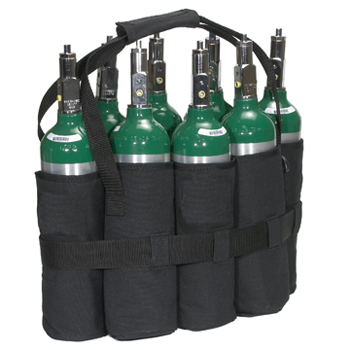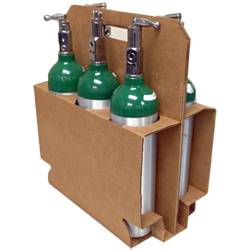PRODUCT CATEGORIES
CLASSES/REGISTRATION
WHAT'S YOUR ROLE?
Safe Handling of Compressed Gas Cylinders
People that are responsible for handling compressed gas cylinders include: drivers, respiratory therapists and warehouse personnel. They must use the appropriate equipment to ensure the safe handling of these cylinders. Compressed gas cylinders function as pressure vessels, which can become dangerous projectiles if their contents are suddenly released due to accidents or mishaps. Rapid gas discharge can happen if a cylinder is dropped and its valve or other components are damaged or broken. A damaged cylinder containing gas can pose risks such as property damage and injury.
To prevent cylinder damage and accidents, it is crucial to employ carriers, bags or carts when handling and transporting cylinders. Especially when dealing with multiple cylinders. Avoid attempting to carry numerous cylinders under your arms, as a misstep can lead to cylinder drops and potential damage.
Carriers are available in various materials, with their durability often linked to the material used. Choose the carrier type that best suits the specific task while ensuring safety. Carriers can be crafted from materials like cardboard, fabric or metal and are particularly useful for delivery drivers who need to transport multiple cylinders to their vehicles or patients' homes.
Cylinder bags offer a lightweight option for moving cylinders. These bags are typically made of heavy-duty cloth and can be conveniently folded into a compact size for easy storage when not in use. They are a good choice for respiratory therapists, who occasionally handle a small number of cylinders.
Cylinder carts provide a practical solution for effortlessly transporting multiple cylinders in a safe manner. Warehouse personnel, drivers and others can use carts to roll cylinders to their required locations. However, caution is essential when transferring cylinders to and from the cart to prevent accidents.
You Might Also Like
Subscribe to our Newsletter
Get the latest regulatory info, accreditation news and exclusive discounts!
 View Cart []
View Cart []



